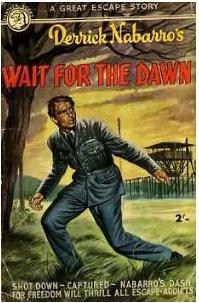 999613
Sergeant Derrick David William Nabarro,
999613
Sergeant Derrick David William Nabarro, 999613
Sergeant Derrick David William Nabarro,
999613
Sergeant Derrick David William Nabarro,
10 Squadron, Royal Air Force.
Born at Edmonton, London on the 4 July 1921; at the outbreak of World War 2 he was a student living at the Royal Hotel, Waterfoot, Nr. Burnley, Lancashire. He died at Teignbridge, Devonshire on the 4 April 1993.
Awarded the Distinguished Conduct Medal in the Suppliment to the London Gazette of 19 January 1943.
The recommendation for an award was as follows:- "This airman, aged 20, was a member of the crew of an aircraft which bombed Bremen on the 29 June 1941. On the return journey they were attacked by FLAK and forced to land in the Baltic Sea. He was first interned at Dulag Luft near Frankfurt am Main, being transferred to Stalag IXC at Bad Sulsa on 15 July 1941. He made unsuccessful attempts to escape in September and again in October 1941, when he was at large several days before being captured. He then commenced preparations for a further attempt which he brought into fruition on 25 November 1941. He made a quick journey to the Luxenbourg frontier existing on tabloid rations but was again captured and locked in a police station. He escaped by overpowering the guard and, after a period of hiding and forced marching, he crossed into Belgium. He later reached France and went to Rouen to rescue a friend whom he knew to be interned at the Heilag Camp in that town. Unsuccessful, he started for the Line of Demarkation. Here he was again captured by the enemy but persuaded his captures that he was a young Frenchman fleeing from cruel and brutal parents to relatives in Paris. The enemy solicitously escorted him back across the Line of Demarkation and handed him to the Vichy officials to be returned to his parents. Declaring his true identity he was interned in Unoccupied France. He was later chiefly instrumental in organising a large scale escape, whereby he and many other RAF personnel returned to this country. Sergeant Nabarro displayed the most remarkable resource and inventive ingenuity in making preparations for his escapes and needs during his journeys. This, combined with his coolness and courage in execution resulted in a magnificent achievement."
Nabarro wrote an account of his escapes in the above illustrated book"Wait for the Dawn" (1952).
Clich here for the official report of Sergeant Nabarro's escapes